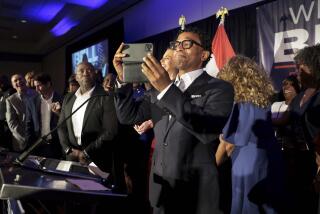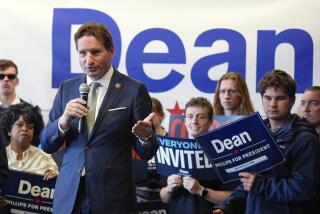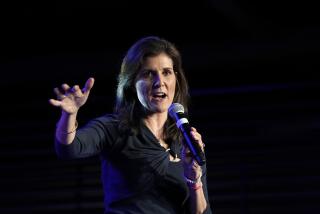Back on His Turf, Gephardt Quits Race
- Share via
ST. LOUIS — Rep. Dick Gephardt’s formal exit Tuesday from the Democratic presidential contest opened up his home state, Missouri, as a potential major battleground for the remaining seven candidates seeking the party’s nomination.
Gephardt tearfully closed his campaign here, where his political career began, after a fourth-place finish in the Iowa caucuses on Monday. He said he had no interest in running for a 15th House term or for the U.S. Senate. Instead, Gephardt said, he would retire from Congress after this year.
“I gave this campaign everything I had in me,” Gephardt said. “Today, my pursuit of the presidency has reached its end. I’m withdrawing as a candidate and returning to private life.”
Asked whether he would accept a vice-presidential nomination, he said he had given the matter no thought and was concentrating on thanking supporters.
Gephardt described his conversations with his former rivals after Monday’s caucus results became clear. He said he talked to Howard Dean “probably first,” even though the former Vermont governor and Gephardt had some harsh exchanges on the campaign trail.
“You really form a bond with people when you run,” Gephardt said. “We’re all committed to the same principles. We’re all committed to winning the White House back.”
Gephardt’s withdrawal freed up his network of loyalists to join other campaigns and left Missouri’s Feb. 3 primary wide open.
Gephardt had been expected to win his native state, the largest delegate prize of any of the seven states voting that day. None of his rivals had spent significant time campaigning here before Gephardt dropped out. Now, Missouri seems up for grabs, even though Gephardt’s name is likely to remain on the ballot.
“It’s anybody’s game here,” said May Scheve, chairwoman of the Missouri Democratic Party. “It’ll be very interesting to see who comes here to Missouri to set up shop.”
Gephardt said Missouri had “a big role to play” and “could have an enormous impact.”
Among his senior staff, talk circulated in the hours after the Iowa caucuses that some of the campaign’s volunteers and field organizers would join Sen. John Edwards of North Carolina.
Edwards had campaigned on a populist platform, like Gephardt, and drew support away from the Missouri congressman in the waning days of the Iowa race, Gephardt campaign officials acknowledged.
Gephardt’s loss was a stinging setback for leaders of the 21 international unions that backed him, including James P. Hoffa, president of the International Brotherhood of Teamsters.
Gephardt, who turns 63 on Jan. 31, said he was looking forward to spending time with his wife, Jane, and their three children: Matt, Chrissy and Kate. He broke down in tears as he recited their names near the end of his news conference.
He said many times on the campaign trail that a run for the presidency was not his wife’s “first choice” of how the couple should spend their time. An elected official for more than half his life, he was a lawyer before he won a seat as a city alderman here in 1970.
His backers said Gephardt put his stamp on the race even in defeat.
In a message posted on the campaign website, campaign manager Steve Murphy contended that Gephardt’s platform of universal, government-subsidized health care and a labor-friendly international trade policy had influenced all of the party’s candidates.
“These messages will continue to resonate with the American public well into the fall elections,” Murphy wrote.
More to Read
Get the L.A. Times Politics newsletter
Deeply reported insights into legislation, politics and policy from Sacramento, Washington and beyond. In your inbox twice per week.
You may occasionally receive promotional content from the Los Angeles Times.










